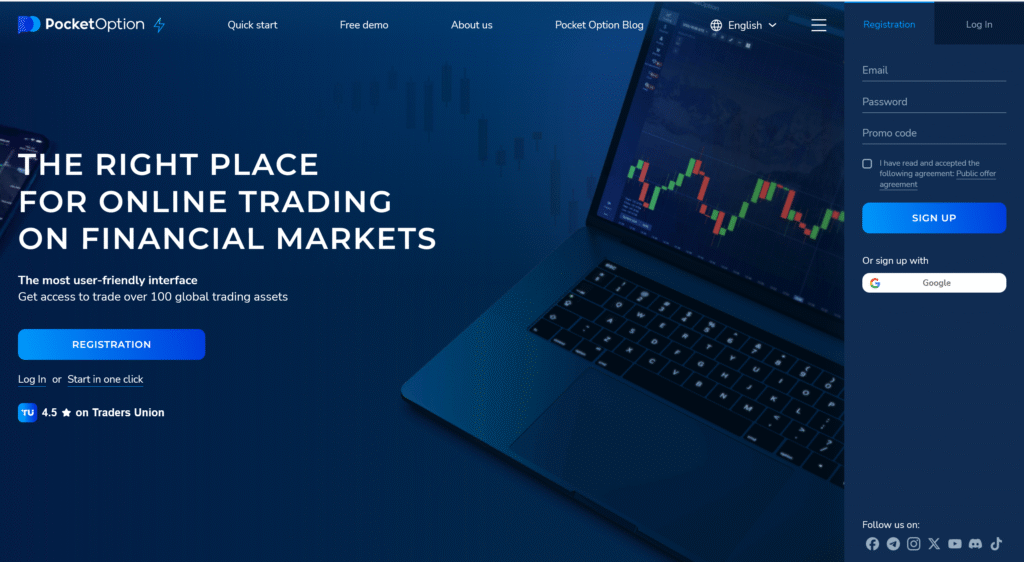
- No Real Regulation — Claims Don’t Match Enforcement
PocketOption markets itself with regulatory claims under the International IBC Regulation Act 2014, ostensibly operating under licensing on the Island of Mwali (Comoros). However, BrokersView reports that the Mwali license of its operating company, Infinite Trade LLC, was suspended in July 2023. Moreover, critics point out that global authorities like the Central Bank of Comoros have challenged MISA’s authority, suggesting the regulatory claims may lack legal foundation. The bottom line: PocketOption has never held a credible, enforceable license, leaving client funds exposed.
- FCA Warns That PocketOption FX Is Unauthorized in the UK
The UK Financial Conduct Authority (FCA) has issued explicit warnings that “PocketOption FX” is not authorized or registered in the UK and that dealing with it exposes clients to serious risk. Any complaints would not be covered by UK financial compensation schemes. That’s a strong signal: in its own jurisdiction, such operators are deemed untrustworthy. - User Complaints Paint a Pattern of Withdrawal Blocks, Trade Manipulation & Income Loss
On Trustpilot and other review platforms, many users claim their withdrawal requests were declined, delayed endlessly, or denied via contrived “verification” or “policy” excuses. Some allege that trades which should have yielded profit were magically turned into losses during the final seconds. One complaint says a “trade limit feature” vanished just before a full-balance trade wiped their account. These are classic hallmarks of broker control over outcomes. - Positive Review Wave & Incentivized Testimonials — Appearances Can Be Bought
Pro-review sites and internal PocketOption content tout a growing user base, frequent positive testimonials, and “payout success” stories. But critics accuse the platform of offering bonus incentives or trade reversals in exchange for glowing reviews or social media promotion. This practice dilutes authenticity and may drown out genuine user gripes.
- OTC Market Claims Increase Manipulation Risk
PocketOption offers over-the-counter (OTC) trading outside standard market hours. However, traders suspect that the platform may generate or manipulate OTC pricing internally rather than linking to real markets. Because you trade in a closed liquidity environment controlled by the broker, price integrity becomes a serious question. Many users report profits working in demo mode but eroding or failing when live trading—especially in OTC segments. - Minimal Transparency on Terms, Fees & Execution Policies
While PocketOption publishes some security features (SSL encryption, fund segregation, KYC), it lacks independent audit verification, transparent fee tables, or robust documentation on slippage, order execution, or trade reversal. The opacity means that when conflicts arise, the broker can interpret conditions in its favor. - Survival Isn’t Proof — Longevity Alone Doesn’t Equal Safety
PocketOption has existed since 2017, and its platform remains live across many countries. But as industry insiders warn, duration does not equal trust. Many fraudulent platforms survive for years before disappearing. The real test is not how long they last, but whether they pay when asked, consistently, under pressure.
Conclusion — PocketOption Is Far From Safe, Treat It As a Crypto Reclaim Priority
PocketOption may look glossy, with flashy interface, low minimum deposits, demo accounts, and a wide asset menu. But underneath lies a structure with deep weaknesses. It claims regulation—but its past license was suspended, and the authority behind that “license” is contested. It’s been publicly warned by the FCA in the UK as an unauthorized entity.
User reports of blocked withdrawals, trade manipulation, vanishing features, and incentivized reviews offer a consistent narrative: profits are accepted, but exits are obstructed. The marketing of OTC trading raises further suspicion that whole segments might be internally controlled price zones, not connected to genuine markets.
If you have funds in PocketOption, don’t wait. Document every deposit, trade, screenshot, and communication. Initiate withdrawal requests immediately. File formal complaints with your country’s financial regulator, law enforcement, and any relevant cross-border bodies. Flag it publicly in forums, complaint boards, and crypto recovery networks to create pressure.
In any broker, trust your ability to withdraw above all promises of profit. In PocketOption’s case, that ability is structurally uncertain at best. Treat it as a potential scam, not a safe investment. Your path forward is no longer “trading” it’s “reclaiming.”
Furthermore, PocketOption’s use of bonuses and promotions introduces fine-print traps. For instance, accepting a bonus automatically binds traders to unrealistic turnover requirements before withdrawals are permitted. This means that even if you double your balance legitimately, you may still be blocked from withdrawing because you didn’t meet the bonus volume clause — a technical loophole that keeps your funds imprisoned.
Another alarming aspect is the lack of financial segregation. In properly regulated brokers, client funds are held separately from company operating accounts. At PocketOption, there’s no verified evidence of such segregation. Deposits likely go straight into the company’s internal pool, where they can be used for payouts, promotions, or simply vanish when the platform eventually shutters or rebrands under a new domain.
Legal recourse is nearly impossible because the company’s jurisdiction — the tiny Island of Mwali, Comoros — offers no meaningful enforcement mechanism. Even if you could file a complaint there, few foreign regulators would recognize the license. In short, any dispute leaves the trader powerless.
Yet, what keeps PocketOption thriving is the illusion of legitimacy through longevity. Operating since 2017, it projects stability. But scammers understand that long-term survival boosts credibility — not by being honest, but by constantly adapting. PocketOption has refined its model to appear compliant while remaining structurally unaccountable. The mix of fast onboarding, crypto funding, and OTC markets ensures regulators struggle to trace or freeze transactions.
In crypto-focused communities, some traders have already launched reclaim initiatives, coordinating to share blockchain evidence of where deposits travel. Early blockchain analysis indicates that customer funds are routed through intermediary wallets before being exchanged or mixed, obscuring the audit trail — another hallmark of laundering activity.
The pattern is disturbingly familiar: attractive interface, inflated win rates, short-term rewards, blocked withdrawals, and eventual silence. Once enough complaints gather, the operator typically retires the domain and migrates to a “new” platform — often with an eerily similar interface and the same marketing tone. When that happens, victims lose both access and legal jurisdiction.
At its core, PocketOption thrives on asymmetry — information, power, and accountability all flow one way. Traders deposit in minutes, but withdrawals take weeks or never complete. The company can change rules overnight, while clients must abide by outdated or hidden clauses. That imbalance is not the mark of a broker — it’s the structure of exploitation.


